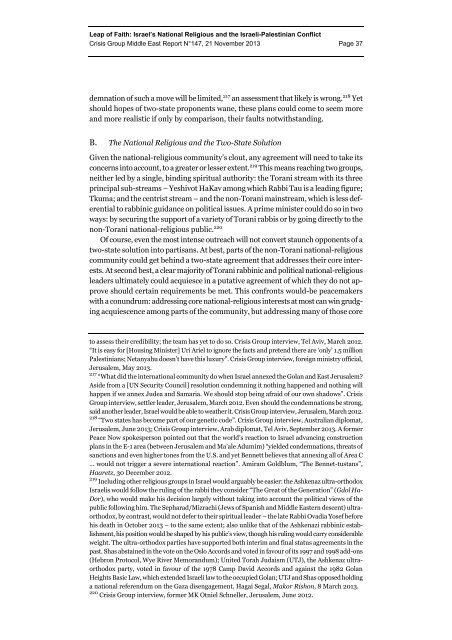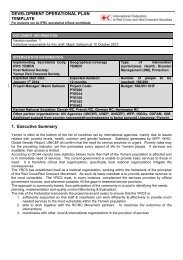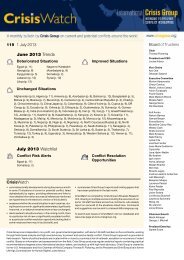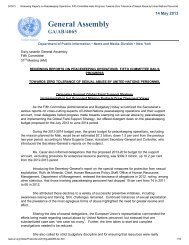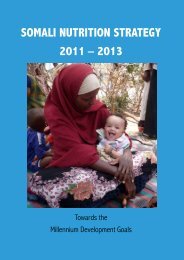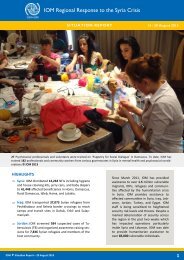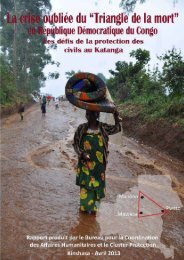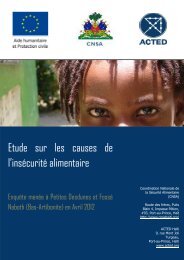Leap of Faith: Israel's National Religious and the Israeli ... - ReliefWeb
Leap of Faith: Israel's National Religious and the Israeli ... - ReliefWeb
Leap of Faith: Israel's National Religious and the Israeli ... - ReliefWeb
Create successful ePaper yourself
Turn your PDF publications into a flip-book with our unique Google optimized e-Paper software.
<strong>Leap</strong> <strong>of</strong> <strong>Faith</strong>: Israel’s <strong>National</strong> <strong>Religious</strong> <strong>and</strong> <strong>the</strong> <strong>Israeli</strong>-Palestinian Conflict<br />
Crisis Group Middle East Report N°147, 21 November 2013 Page 37<br />
demnation <strong>of</strong> such a move will be limited, 217 an assessment that likely is wrong. 218 Yet<br />
should hopes <strong>of</strong> two-state proponents wane, <strong>the</strong>se plans could come to seem more<br />
<strong>and</strong> more realistic if only by comparison, <strong>the</strong>ir faults notwithst<strong>and</strong>ing.<br />
B. The <strong>National</strong> <strong>Religious</strong> <strong>and</strong> <strong>the</strong> Two-State Solution<br />
Given <strong>the</strong> national-religious community’s clout, any agreement will need to take its<br />
concerns into account, to a greater or lesser extent. 219 This means reaching two groups,<br />
nei<strong>the</strong>r led by a single, binding spiritual authority: <strong>the</strong> Torani stream with its three<br />
principal sub-streams – Yeshivot HaKav among which Rabbi Tau is a leading figure;<br />
Tkuma; <strong>and</strong> <strong>the</strong> centrist stream – <strong>and</strong> <strong>the</strong> non-Torani mainstream, which is less deferential<br />
to rabbinic guidance on political issues. A prime minister could do so in two<br />
ways: by securing <strong>the</strong> support <strong>of</strong> a variety <strong>of</strong> Torani rabbis or by going directly to <strong>the</strong><br />
non-Torani national-religious public. 220<br />
Of course, even <strong>the</strong> most intense outreach will not convert staunch opponents <strong>of</strong> a<br />
two-state solution into partisans. At best, parts <strong>of</strong> <strong>the</strong> non-Torani national-religious<br />
community could get behind a two-state agreement that addresses <strong>the</strong>ir core interests.<br />
At second best, a clear majority <strong>of</strong> Torani rabbinic <strong>and</strong> political national-religious<br />
leaders ultimately could acquiesce in a putative agreement <strong>of</strong> which <strong>the</strong>y do not approve<br />
should certain requirements be met. This confronts would-be peacemakers<br />
with a conundrum: addressing core national-religious interests at most can win grudging<br />
acquiescence among parts <strong>of</strong> <strong>the</strong> community, but addressing many <strong>of</strong> those core<br />
to assess <strong>the</strong>ir credibility; <strong>the</strong> team has yet to do so. Crisis Group interview, Tel Aviv, March 2012.<br />
“It is easy for [Housing Minister] Uri Ariel to ignore <strong>the</strong> facts <strong>and</strong> pretend <strong>the</strong>re are ‘only’ 1.5 million<br />
Palestinians; Netanyahu doesn’t have this luxury”. Crisis Group interview, foreign ministry <strong>of</strong>ficial,<br />
Jerusalem, May 2013.<br />
217 “What did <strong>the</strong> international community do when Israel annexed <strong>the</strong> Golan <strong>and</strong> East Jerusalem?<br />
Aside from a [UN Security Council] resolution condemning it nothing happened <strong>and</strong> nothing will<br />
happen if we annex Judea <strong>and</strong> Samaria. We should stop being afraid <strong>of</strong> our own shadows”. Crisis<br />
Group interview, settler leader, Jerusalem, March 2012. Even should <strong>the</strong> condemnations be strong,<br />
said ano<strong>the</strong>r leader, Israel would be able to wea<strong>the</strong>r it. Crisis Group interview, Jerusalem, March 2012.<br />
218 “Two states has become part <strong>of</strong> our genetic code”. Crisis Group interview, Australian diplomat,<br />
Jerusalem, June 2013; Crisis Group interview, Arab diplomat, Tel Aviv, September 2013. A former<br />
Peace Now spokesperson pointed out that <strong>the</strong> world’s reaction to Israel advancing construction<br />
plans in <strong>the</strong> E-1 area (between Jerusalem <strong>and</strong> Ma’ale Adumim) “yielded condemnations, threats <strong>of</strong><br />
sanctions <strong>and</strong> even higher tones from <strong>the</strong> U.S. <strong>and</strong> yet Bennett believes that annexing all <strong>of</strong> Area C<br />
… would not trigger a severe international reaction”. Amiram Goldblum, “The Bennet-tustans”,<br />
Haaretz, 30 December 2012.<br />
219 Including o<strong>the</strong>r religious groups in Israel would arguably be easier: <strong>the</strong> Ashkenaz ultra-orthodox<br />
<strong>Israeli</strong>s would follow <strong>the</strong> ruling <strong>of</strong> <strong>the</strong> rabbi <strong>the</strong>y consider “The Great <strong>of</strong> <strong>the</strong> Generation” (Gdol Ha-<br />
Dor), who would make his decision largely without taking into account <strong>the</strong> political views <strong>of</strong> <strong>the</strong><br />
public following him. The Sepharad/Mizrachi (Jews <strong>of</strong> Spanish <strong>and</strong> Middle Eastern descent) ultraorthodox,<br />
by contrast, would not defer to <strong>the</strong>ir spiritual leader – <strong>the</strong> late Rabbi Ovadia Yosef before<br />
his death in October 2013 – to <strong>the</strong> same extent; also unlike that <strong>of</strong> <strong>the</strong> Ashkenazi rabbinic establishment,<br />
his position would be shaped by his public’s view, though his ruling would carry considerable<br />
weight. The ultra-orthodox parties have supported both interim <strong>and</strong> final status agreements in <strong>the</strong><br />
past. Shas abstained in <strong>the</strong> vote on <strong>the</strong> Oslo Accords <strong>and</strong> voted in favour <strong>of</strong> its 1997 <strong>and</strong> 1998 add-ons<br />
(Hebron Protocol, Wye River Memor<strong>and</strong>um); United Torah Judaism (UTJ), <strong>the</strong> Ashkenaz ultraorthodox<br />
party, voted in favour <strong>of</strong> <strong>the</strong> 1978 Camp David Accords <strong>and</strong> against <strong>the</strong> 1982 Golan<br />
Heights Basic Law, which extended <strong>Israeli</strong> law to <strong>the</strong> occupied Golan; UTJ <strong>and</strong> Shas opposed holding<br />
a national referendum on <strong>the</strong> Gaza disengagement. Hagai Segal, Makor Rishon, 8 March 2013.<br />
220 Crisis Group interview, former MK Otniel Schneller, Jerusalem, June 2012.


